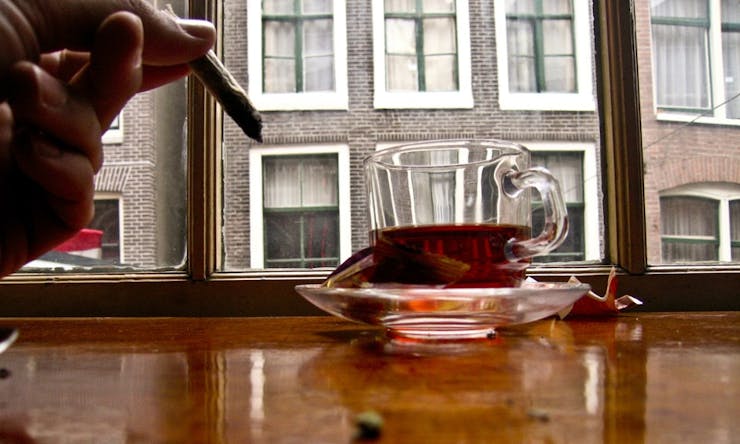In both the EU and the U.S., two different models permit the legal transfer of cannabis. While medical dispensaries serve patients in certain U.S. states, so-called Cannabis Social Clubs in Spain facilitate the cultivation and delivery of cannabis on an almost nationwide scale. The closest counterpart to the adult-use stores in Colorado, Washington state, and Oregon, meanwhile, remain the coffeeshops of the Netherlands, where cured flower has been sold since the 1970s.
Despite the parallels, however, the European models differ fundamentally from those overseas. That much is apparent even at the counters at which the cannabis changes hands.
The Pioneers: Coffeeshops in the Netherlands
Since 1976, the Netherlands has had in place a so-called soft-drugs tolerance policy. A new law had just taken effect that drew a clear line between “soft” and “hard” drugs — in large part because of a massive heroin problem in Amsterdam in the ‘70s. Although, the sale of cannabis and hashish technically remains an offense, municipalities have the authority to license cannabis coffeeshops. Dutch authorities won’t prosecute coffeeshops adhering to the following regulations:
- Maximum sale of 5 grams per person;
- Maximum amount of 500 grams in the store
- No disturbance of the public order
- No sale of hard drugs
- No entry for minors under 18
- Coffeeshops may not advertise
- No coffeeshops may be located within 250 meters of a school
The last rule, known as the “distance criterion,” has greatly reduced the number of coffeeshops in Amsterdam in recent years. The approximately 160 remaining shops are frequently crowded, and their products sometimes overpriced, due to a lack of competition. Nevertheless, with a little local knowledge it's still possible to track down very good flower or rare strains at reasonable prices.
Due to the lack of a robust legal structure, there is no mandatory quality- or pesticide-control whatsoever. In addition, the illegal status of suppliers and producers means that the market has necessarily employed criminal structures for more than 40 years. Even shop owners have no legal certainty, because cannabis products are only legal once they get in through the back door. The phenomenon is widely known as the "backdoor problem” and remains the biggest paradox of Dutch drug policy.
Cannabis Social Clubs
The first Cannabis Social Clubs emerged well over a decade ago in Spain. Members of the clubs collectively grow cannabis, which is distributed through a predetermined system. The private nature of the Asociaciones is the key to their existence, taking advantage of more tolerant passages in the country’s relatively liberal drug laws.
Belgium followed suit with two Cannabis Social Clubs, and in Uruguay, the number of clubs has risen steadily since the re-legalization of cannabis in April 2014. In Uruguay, the size of a club is limited to 49 people in order to prevent commercialization of clubs, as Spain — and especially Barcelona — has witnessed. In December 2015, the Spanish Supreme Court ruled that clubs with more than 300 members qualify as commercial organizations, sentencing two members and two board members of the Basque club Pannagh, including its president, Martin Barriuso, a prominent leader of the Cannabis Social Club movement.
Shop highly rated dispensaries near you
Showing you dispensaries nearIn Barcelona during the second half of 2014, many clubs that served tourists, deemed “short-time members,” were shut down by local police. The remaining clubs must now adhere to strict rules adopted by the city:
- Supply follows demand, not vice versa
- No private profits; all profits must be invested for club purposes
- Transparency
- Open dialogue with the authorities
- All growing activities are carried out according to organic farming standards
What's the Best Option?
The Dutch coffeeshop model, which has proven its value over the last 40 years, is in immediate danger because of gaps between the law, cultural tolerance, and commerce. If policy makers can bridge those gaps, the country’s shops will only differ in degrees from those in Denver, Seattle, or Eugene (though notably, consumption in Dutch coffeeshops is permitted).
For most casual consumers, who don’t partake regularly and couldn’t care less about growing, a Cannabis Social Club would provide a means to be able to purchase cannabis legally — but on some level, that counteracts the collective-cultivation, “club” idea. This has already led to considerable difficulties in Spain, as some clubs have begun to act like commercial coffeeshops, compromising the model and making life difficult for clubs that stay true to their non-commercial, cooperative roots. If clubs are the only option, many feel the black market will continue to thrive.
The umbrella organization for Spanish Cannabis Social Clubs, FAC, has therefore called for the approval of cannabis-specialized stores. Entrepreneurs who want to build a business could open commercial coffeeshops, while others could still join together to form a club under the existing model. Most people buy their fruit or beverages in a supermarket or grocery store; only a tiny few set up horticultural clubs in order to grow, harvest, and process their produce together. The best, most honest option for a regulated EU cannabis market would be to include both models: Cannabis Social Clubs and commercial coffeeshops.











